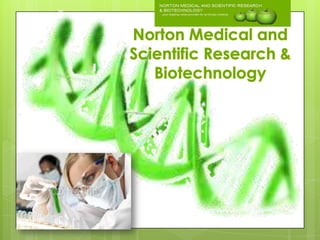Gene therapy restores sense of smell
•Download as PPTX, PDF•
1 like•484 views
Norton Medical and Scientific Research & Biotechnology is dedicated to publishing the latest news, mainly on, medical research and biotechnology advancements.
Report
Share
Report
Share

Recommended
Recommended
More than Just Lines on a Map: Best Practices for U.S Bike Routes
This session highlights best practices and lessons learned for U.S. Bike Route System designation, as well as how and why these routes should be integrated into bicycle planning at the local and regional level.
Presenters:
Presenter: Kevin Luecke Toole Design Group
Co-Presenter: Virginia Sullivan Adventure Cycling AssociationMore than Just Lines on a Map: Best Practices for U.S Bike Routes

More than Just Lines on a Map: Best Practices for U.S Bike RoutesProject for Public Spaces & National Center for Biking and Walking
More Related Content
Featured
More than Just Lines on a Map: Best Practices for U.S Bike Routes
This session highlights best practices and lessons learned for U.S. Bike Route System designation, as well as how and why these routes should be integrated into bicycle planning at the local and regional level.
Presenters:
Presenter: Kevin Luecke Toole Design Group
Co-Presenter: Virginia Sullivan Adventure Cycling AssociationMore than Just Lines on a Map: Best Practices for U.S Bike Routes

More than Just Lines on a Map: Best Practices for U.S Bike RoutesProject for Public Spaces & National Center for Biking and Walking
Featured (20)
AI Trends in Creative Operations 2024 by Artwork Flow.pdf

AI Trends in Creative Operations 2024 by Artwork Flow.pdf
Content Methodology: A Best Practices Report (Webinar)

Content Methodology: A Best Practices Report (Webinar)
How to Prepare For a Successful Job Search for 2024

How to Prepare For a Successful Job Search for 2024
Social Media Marketing Trends 2024 // The Global Indie Insights

Social Media Marketing Trends 2024 // The Global Indie Insights
Trends In Paid Search: Navigating The Digital Landscape In 2024

Trends In Paid Search: Navigating The Digital Landscape In 2024
5 Public speaking tips from TED - Visualized summary

5 Public speaking tips from TED - Visualized summary
Google's Just Not That Into You: Understanding Core Updates & Search Intent

Google's Just Not That Into You: Understanding Core Updates & Search Intent
The six step guide to practical project management

The six step guide to practical project management
Beginners Guide to TikTok for Search - Rachel Pearson - We are Tilt __ Bright...

Beginners Guide to TikTok for Search - Rachel Pearson - We are Tilt __ Bright...
Unlocking the Power of ChatGPT and AI in Testing - A Real-World Look, present...

Unlocking the Power of ChatGPT and AI in Testing - A Real-World Look, present...
More than Just Lines on a Map: Best Practices for U.S Bike Routes

More than Just Lines on a Map: Best Practices for U.S Bike Routes
Gene therapy restores sense of smell
- 2. Gene Therapy Restores Sense Of Smell Researchers from University of Michigan Medical School, along with the help of other universities, have published a report on Nature Medicine about gene therapy helping people restore the sense of smell. The mice they used for the study are those with a genetic defect that results in having less amounts of microscopic hairs in their body (cilia) that they rely on for detecting chemicals in the air. Microscopic cilia are sticking out from numerous cells in their body and even simple damages on them can be severely harmful for the rat. But if losing the sense of smell for mice could bring poor feeding habits and lead to death, for humans this can be equally fatal.
- 3. To do the experiment, scientists planted the genes into cells of the mice through a common cold virus that contains many normal DNA, enabling it to infect cells easily. It was then injected into the nose of the mice for 3 consecutive days. Two weeks after they were given the 3-day treatment, researchers discovered that the mice have gained weight by 60%, lending proof that feeding habits improved. For scam prevention, they verified that the neurons of the mice are working properly when exposed to banana oil (amyl acetate). «At the molecular level, function that had been absent was restored. The scientists say that almost all cells in the body have the ability to grow one or more cilia...When loss of smell occurs, receptors the connect odorants are restrained on the cilia, resulting the loss of cilia, and the loss of sense of smell,» said one of the researchers.
- 4. However, it will take more studies for this to be applicable to humans who have lost their ability to smell due to medical conditions (though for people who cannot smell because of old age or nose trauma, this treatment is believed to be inapplicable). Professor Philip Beales of the University College London who was also involved in the research said, «It is a proof of concept that has shown we can get that gene back into these cells, produce the right protein, produce cilia and function as expected.